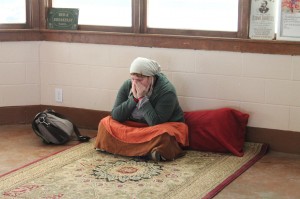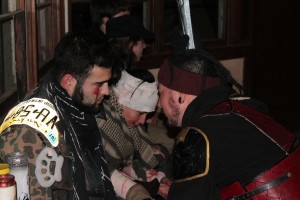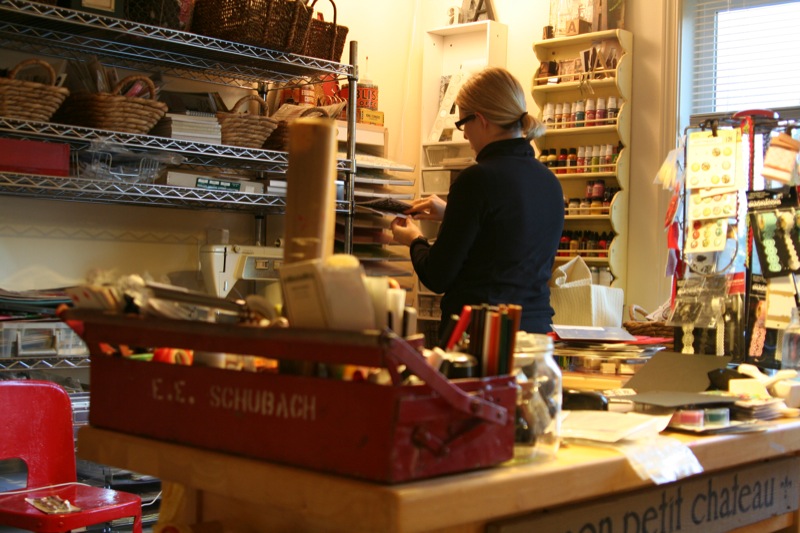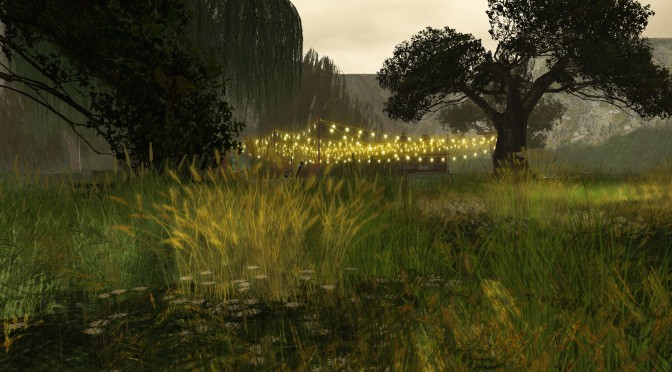Live-action role-playing (larp) occupies a unique place among analog games, for it demands as much from players’ bodies as it does from their minds. It comes then as no surprise that many players find themselves in the situation of feeling confused, exhausted, and emotionally raw after a larp event. In fact, larpers frequently exhaust themselves in advance through the leisure labor of planning their costumes, character actions, possible outcomes, and interactions. Subsequently, the event itself often features what some would describe as “intense content” – dramatic interpersonal dynamics, improvisational comedy, combat, political struggles, problem solving, etc. Intense content is there by design in order to maximize the emotional impact of the game. The sheer amount of emotional intensity experienced in a short time frame can impact any given larper, regardless of whether or not they found the experience enjoyable.
As with any high, the comedown can often feel shocking and depressing.
According to many larpers, the return to the “real world” can feel deflating. The mind must divest itself from the vivid social reality of the larp, and attempting to communicate with outsiders about the events of game can feel alienating. Petri Lankoski and Simo Järvelä have argued that role-playing immersion and emotional bleed between the character and the player are, in fact, cognitive processes and “natural consequences” of how “the brain works.” The emotional highs of game most likely have a hormonal component; endorphins, adrenaline, dopamine, serotonin, and oxytocin levels shift as the result of game stimuli. As with any high, the comedown can often feel shocking and depressing.

Post-larp depression is a common phenomenon and should not cause players excessive concern. Indeed, participants report similar experiences after attending events at fan conventions, conferences, kink scenes, festivals, and so on. The BDSM community in particular has developed strategies for aftercare, referring to the depression participants experience after a scene as “crash” and “drop.” Both scholars and practitioners have noted the connection between BDSM and role-playing scenes, indicating that the phenomenological mental processes are probably similar. Mental illness and role-play are not necessarily interrelated, but the drop after an intense event may trigger imbalances already in place. This article describes strategies some larpers employ for transitioning between the game to the “real world” and coping with post-larp depression. By mobilizing these diverse techniques, larpers recognize the larp as a non-trivial intervention in their daily emotional lives.
The drop after an intense event may trigger imbalances already in place.
One of the most common strategies is to tell war stories and/or hold a debriefing afterwards, both of which constitute a reframing of the larp material. Larpers often process the experiences they had by sharing memories of what transpired in the game with one another. War stories tend to valorize, intellectualize, or make humorous moments that occurred in game, whereas debriefing tends to take emotional content seriously in order to process and move through it. Both forms of “reframing” are important for larpers, allowing them to validate their experiences in the eyes of others. Storytelling also permits larpers to structure the oft-chaotic experience of a larp, drawing together a cohesive narrative that is easier to master. War stories can be found anywhere there are larpers. However, those who choose to debrief are perhaps best able to do so in small groups with trusted friends and/or in a structured fashion with a moderator. Some larpers also assign each other debriefing buddies, who promise to contact each other in some fashion later. These debriefing buddies are expected to remain available to each other long-term as they share feelings that come up days, weeks, or months after the larp.

Adapted from psychotherapy, some larp circles also employ the process of deroling to recover from larpers’ adoption of an alternate persona for long periods of time, which requires a different frame of reference. Regardless of whether a larper’s “real” persona is similar, pleasant and unpleasant in-game memories, thoughts, and emotions persist long after the larp has ended. Such thoughts, emotions, and experiences may bleed-out into one’s daily life. Some larpers thus perform de-roling rituals to avoid problematic forms of bleed. These de-roling rituals vary in activity and scope, but include: taking off a piece of one’s character’s costume and placing it in a circle, saying goodbye to the character for a time; thinking of one or more aspects of one’s character that one admires and “taking” it with them; thinking of one or more aspects of one’s character one dislikes and wishes to leave behind; speaking about one’s character in the third person during war stories or debriefing to emphasize a sense of distance; and making sure to interact with all the people from a larp both in-character and out-of-character to emphasize the distinction.
Socializing with one’s fellow larpers actually tends to increase the feelings of emotional safety in the larp space
Other larpers forego the angst and throw a party instead. Oftentimes, relaxing pre- and post-game social events unaffiliated with the game fiction help players connect with one another and relieve post-game depression. These social events include MeetUps, “afters,” dinners, parties, coffee dates, online discussions, etc. Socializing with one’s fellow larpers actually tends to increase the feelings of emotional safety in the larp space, so that players get to know one another well and can better distinguish between in-game and out-of-game actions. Also, interacting in new contexts tends to deepen bonds of friendship that already get forged at the game. Social events give larpers the space to have conversations with one another that might not otherwise take place, working through conflict and increasing trust.
Some players further emphasize nurturing their physical and emotional well-being after a larp, taking care of mind and body. They insist upon players sleeping, eating, bathing well, and not pushing themselves too hard. Human touch is also said to be helpful, if one feels comfortable with hugs. Depending on the intensity of the larp, sometimes people can take days to recover. For the mind, some players find it helpful to write about their experiences after events. Players may share these memories or keep them private. The mere act of committing events to paper helps individuals externalize and order their experiences in a meaningful way. Players may also seek to simply distract themselves, moving from one immersive activity to another: watching a few episodes of a television show, reading a book, playing another role-playing game, and so forth. Transporting the frame of reference from one to another may smooth the transition for some players.
Lastly, one effective strategy to ease the transition back to the mundane world is the act of showing gratitude to the other larpers and the organizers themselves. This act of storytelling can boost morale. It dignifies the presence of all involved, and lets everyone know that they mutually enhanced each other’s experience. The organizers in particular expend a great deal of time and energy to create a fulfilling experience, and players who acknowledge that effort may find the overall experience of returning to life less deflating.

Not all players experience post-larp depression, however. Some fluidly transition back to their daily lives. Other participants have noted an inverse phenomenon called “post-larp charisma,” in which players are fueled with an abundance of creative energy. Others still object to the use of psychological terms such as “depression” or the more conversational phrase “post-larp blues,” preferring to refer to the phenomenon as “post-larp” to avoid the connotations of mental dysfunction. Responses to intense game events can vary and no one strategy works for all people. The most important point remains, however: the effects of larp on the players are often too significant to ignore, as are the impact of the techniques outlined here.
–
Featured image borrowed from Liqueur Felix @Flickr.
–
This essay was written by Sarah Lynne Bowman and Evan Torner.
Sarah Lynne Bowman, PhD received her BS and MS from the University of Texas at Austin in Radio-TV-Film and her PhD from UT Dallas in Arts and Humanities. McFarland Press published her dissertation in 2010 as The Functions of Role-playing Games: How Participants Create Community, Solve Problems, and Explore Identity. Together with Aaron Vanek, Bowman co-edited The Wyrd Con Companion 2012, a collection of essays on larp and related phenomena. Bowman teaches as adjunct faculty in English and Communication for several institutions including The University of Texas at Dallas. Her current research interests include examining social conflict and bleed within role-playing communities, applying Jungian theory to role-playing studies, studying the benefits of edu-larp, and comparing the enactment of role-playing characters with other creative phenomena such as drag performance. Other interests include psychoanalysis, comparative religion, evolutionary psychology, gender and sexuality studies, fantasy/science fiction, and history of human consciousness.
Experimentation and Design editor, Evan Torner, PhD (University of Massachusetts Amherst), is Assistant Professor of German Studies at the University of Cincinnati. His dissertation “The Race-Time Continuum: Race Projection in DEFA Genre Cinema” explores East German westerns, musicals and science fiction in terms of their representation of the Global South and its place in Marxist-Leninist historiography. This research has been supported by Fulbright and DEFA Foundation grants, as well as an Andrew W. Mellon Postdoctoral Fellowship at Grinnell College from 2013-14. His fields of expertise include East German genre cinema, German film history, critical race theory, and science fiction. His secondary fields of expertise include role-playing game studies, Nordic larp, cultural criticism, electronic music and second-language pedagogy. Torner has contributed to the field of game studies by way of his co-edited volume (with William J. White) entitled Immersive Gameplay: Essays on Role-Playing and Participatory Media (McFarland, 2012). He organized the Pioneer Valley Game Studies Colloquium in 2012, and helps organize JiffyCon, Origins Games on Demand, and Western Massachusetts Interactive Literature Society (WMILS) events. His freeform scenario “Metropolis” was nominated for “Best Game Devices” at Fastaval 2012 in Hobro, Denmark, and several other scenarios have been selected for the program. These scenarios constitute part of a larger book project that teaches German cinema through the medium of live-action games. He has also written prose for the Knutepunkt books as well as Playground magazine. He can be reached at evan.torner <at> gmail.com.

